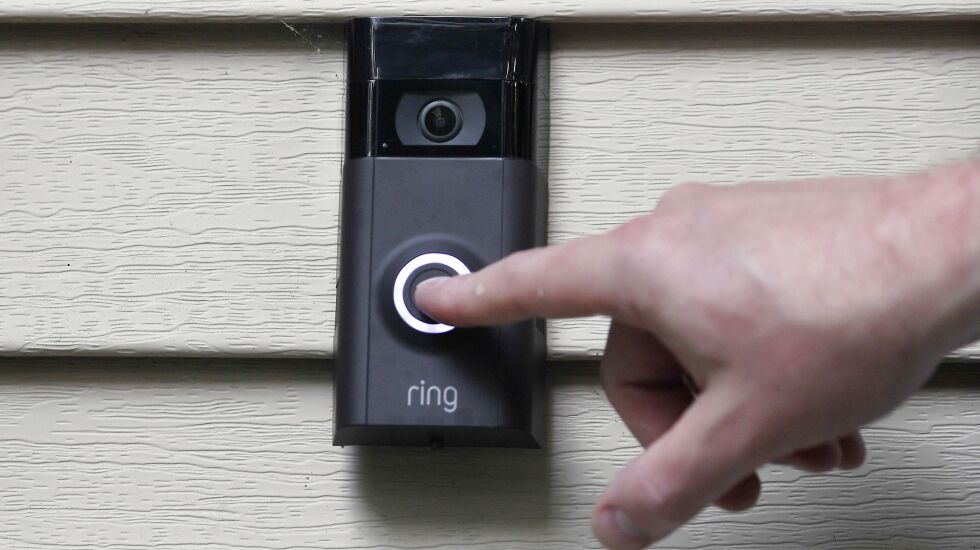
Two days before kicking off her reelection bid, Mayor Lori Lightfoot on Monday finally launched the security freebie she dangled before Chicagoans two months ago.
On April 4, Lightfoot announced that Chicago homeowners and small-business owners concerned about violent crime would be eligible for rebates to defray the cost of security cameras, outdoor motion sensor lighting, cloud storage and GPS trackers to hunt down their vehicles in the event of an auto theft or carjacking. It was the fourth time in five days that Lightfoot had offered a multimillion-dollar giveaway to Chicago residents in advance of the February 2023 mayoral election.
The mayor waited until this week — when she also plans her second-term campaign kickoff — to launch the $5.4 million security program.
Starting Monday, Chicago homeowners, renters and business owners who can prove that they have purchased outdoor security cameras, cloud storage for video footage, outdoor motion sensor lighting, GPS trackers and subscription costs will be eligible for up to $1,020 to defray those costs.
The program is also open to religious institutions and nonprofit organizations. Renters must first obtain consent of the property owner.
To apply, go to chicago.gov/hbpp.
In addition to proof of purchase for each security device, applicants must include documentation of the camera system’s ability to retain video footage for at least 72 hours, the city said, and proof each device has been installed.
“We heard loud and clear from residents that this is something that they wanted. … This is one-stop shopping for folks who want to make sure that their home and their property are protected,” Lightfoot told a news conference at Saint Sabina Church, 1210 W. 78th Place.
“If you don’t have the resources upfront, don’t worry. We will help you. If you’re not able to do the installation yourself, don’t worry. We’re here to help you. ... We want everybody who wants a camera, who wants lighting, who wants a GPS tracker to be able to get it across our city.”
During the initial announcement in early April, Lightfoot declared that all subsidized camera systems would be registered with the Chicago Police Department as a way to increase coverage in crime-plagued neighborhoods and help inundated Chicago police officers with the video evidence they need to solve violent crime.
The mayor and Police Supt. David Brown also urged Chicago homeowners and small-business owners on that day to register their existing cameras with the Chicago Police Department.
On Monday, Lightfoot was singing a slightly different tune.
“While registration of the cameras with the Chicago Police Department is not required for reimbursement, we strongly encourage people to do so as the footage that they capture can be useful in helping the department during criminal investigations,” the mayor said.
“The other important factor of having the cameras and the lighting is to deter crime before it even happens. When somebody is looking at a house that’s vulnerable, they’re not gonna pick a house that’s got cameras, that’s got lighting and other things that the homeowner is proactively doing to protect themselves.”
Lightfoot has noted that more affluent Chicago neighborhoods are loaded with private security cameras while communities “with a long history of violent crime” have comparatively few.
To even the playing field, the city plans to partner with community-based organizations to offer security devices in 15 South and West Side neighborhoods with “historical trends of violence.”
Those targeted neighborhoods are Auburn Gresham, Austin, Chicago Lawn, East Garfield Park, Englewood, Greater Grand Crossing, Humboldt Park, New City, North Lawndale, Roseland, South Lawndale, South Shore, West Englewood, West Garifeld Park and West Pullman.
What happens if demand for security equipment exceeds the $5.4 million the city has budgeted?
“We’re starting out with $5.4 [million]. But if we see a significant uptake and we need to put more resources into it, we definitely will. I’ll be asking the City Council for more resources for sure,” Lightfoot said.
“This is an issue of community safety that is animating kitchen table conversations, breakfast table conversations. People want to feel safe. ... We want to make sure that we’re listening.”







